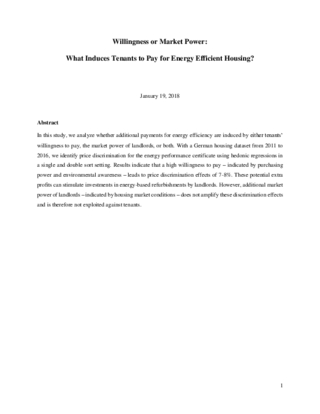In this study, we analyze whether additional payments for energy efficiency are induced by either tenants’ willingness to pay, the market power of landlords, or both. With a German housing dataset from 2011 to 2016, we identify price discrimination for the energy performance certificate using hedonic regressions in a single and double sort setting. Results indicate that a high willingness to pay -– indicated by purchasing power and environmental awareness -– leads to price discrimination effects of 7-8%. These potential extra profits can stimulate investments in energy-based refurbishments by landlords. However, additional market power of landlords –- indicated by housing market conditions –- does not amplify these discrimination effects and is therefore not exploited against tenants.
Pommeranz, Carolin, and Bertram Ingolf Steininger. "Willingness or Market Power: What Induces Tenants to Pay for Energy Efficient Housing?" In 25th Annual European Real Estate Society Conference. ERES: Conference. Reading, UK, 2018.
Section: Refereed session
